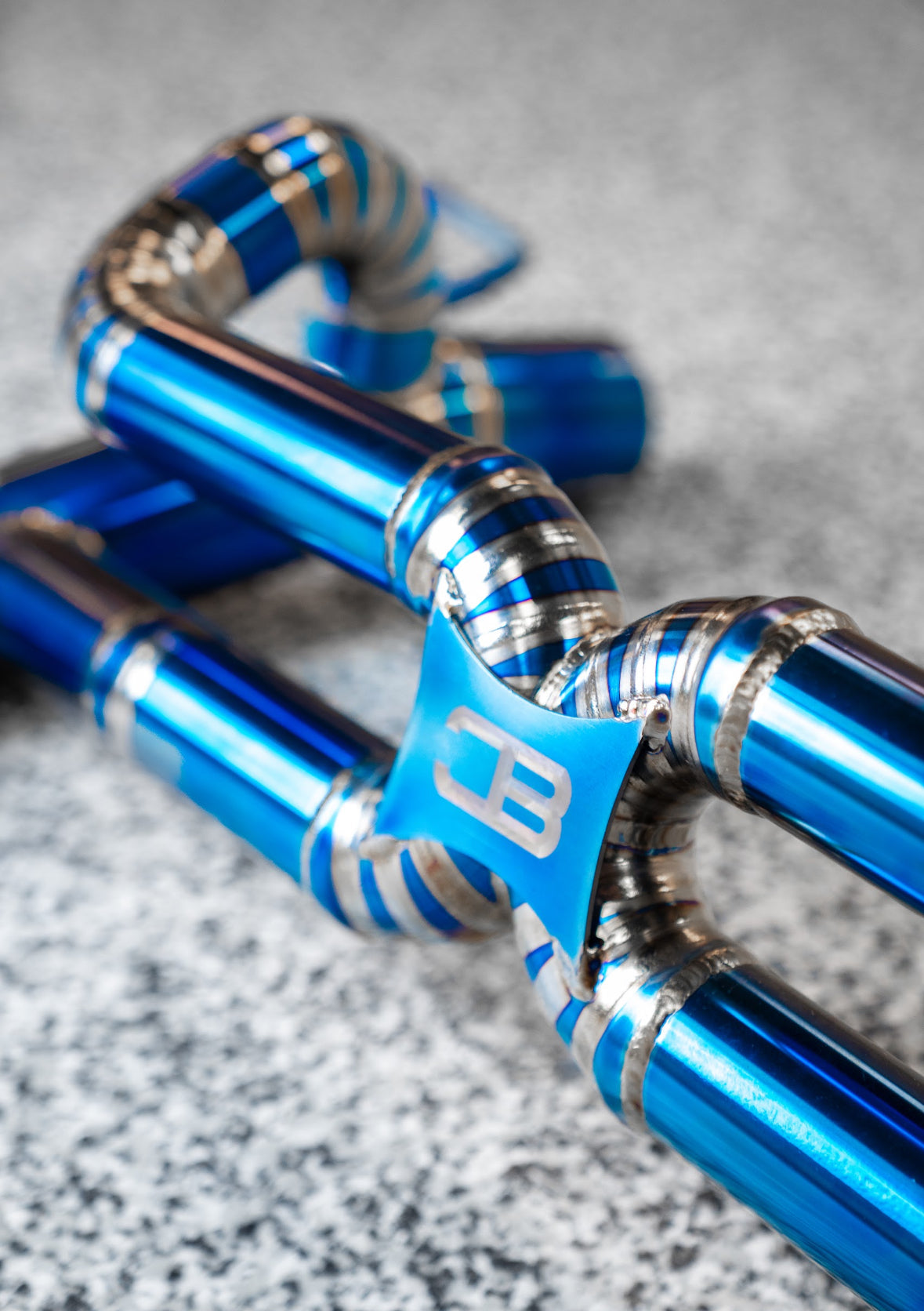
Stainless Steel vs. Titanium Exhausts: Which Is Right for Your Car?
One of the common questions for anyone considering a CB Customs exhaust is whether to choose stainless steel or titanium construction. We offer many of our exhaust systems in both materials. Each has its pros and cons, and the best choice depends on your goals and budget. Let’s compare:
Stainless Steel Exhausts: Most performance exhausts are made from high-grade stainless steel (such as T304 or T309 stainless). Stainless steel is strong, durable, and cost-effective. It resists corrosion much better than plain steel, ensuring longevity even on a car that’s driven in rain or snow. Our CB Customs stainless systems use mandrel-bent tubing for smooth flow and are fully TIG-welded for strength. Stainless can handle high exhaust temperatures, especially the specialty grades – for example, Capristo uses T309 stainless alloy, which is so heat-resistant that it’s “similar to Inconel, used in Formula 1 exhaust systems”. This means a well-made stainless exhaust can endure track use and aggressive driving without issues. On the downside, stainless steel is heavier than titanium. While our designs mitigate weight with efficient construction, a stainless cat-back will typically weigh a bit more than the equivalent titanium version. Also, stainless doesn’t have the exotic “blue-purple” heat coloring that raw titanium develops, though many stainless systems have polished or brushed finishes that still look great. Overall, if you want excellent durability and value, and can handle a few extra pounds, stainless is a fantastic choice – particularly for daily-driven cars or those in harsh climates (since stainless is very robust).
Titanium Exhausts: Titanium is the material of choice for those seeking maximum weight reduction and a motorsport pedigree. It’s significantly lighter than steel – a well-known example is an Akrapovič titanium system which is 35% lighter than the stock exhaust it replaces. In practice, switching to a titanium exhaust can save anywhere from ~10 to 40 pounds depending on the car and how extensive the exhaust section is, which is a substantial reduction. Titanium is also extremely corrosion-resistant (it won’t rust, even if you drive in winter salt). Additionally, titanium has that wow factor: it changes color when heated, showing blue, purple, and gold hues at the welds and bends, which many enthusiasts love as a signature look of a titanium exhaust. However, there are a few considerations: cost is the big one – titanium is a more expensive material and trickier to fabricate (welding Ti requires special techniques), so titanium exhausts typically cost considerably more than stainless. Also, titanium is slightly more brittle; while fine for street use, a titanium system could potentially crack under severe vibration or repeated track heat cycles if not properly designed. (We mitigate this by using quality titanium alloys and proper mounting points in our designs.) Lastly, titanium has a different sound character – it tends to produce a slightly higher-pitched exhaust note compared to stainless. Some people even describe it as having a “sharper” sound, which can be amazing on high-revving engines.
Which to Choose? If you are building a track-focused car or simply want the lightest, most exclusive setup, a titanium exhaust is hard to beat. The weight savings contribute to performance, and the exotic look and sound are bonuses. On the other hand, if you’re looking for a rugged daily driver setup, or a more budget-friendly option that still delivers performance and sound, a stainless steel exhaust will tick those boxes. Many enthusiasts go with stainless for street cars and titanium for special toys or all-out builds. Both materials used by CB Customs are high-quality and will significantly improve over the stock exhaust. It ultimately comes down to whether shaving, say, 15-20 lbs and having that exotic metal is worth the extra investment to you. Either way, you’ll be getting a freer flowing exhaust and that signature CB Customs craftsmanship.
Fun fact: Some top exhaust manufacturers actually blend the two – using stainless steel for structural sections and titanium for mufflers or tips, or even using Inconel (a super alloy) for portions that see extreme heat, as a middle ground. For example, Capristo’s use of T309 stainless (close to Inconel) gives near-titanium heat resistance, and other brands use titanium for weight savings elsewhere. At CB Customs, we’re happy to advise you on the best material for your specific needs and vehicle model – you truly can’t go wrong with either, but it’s about finding your perfect balance of weight, strength, sound, and cost.
